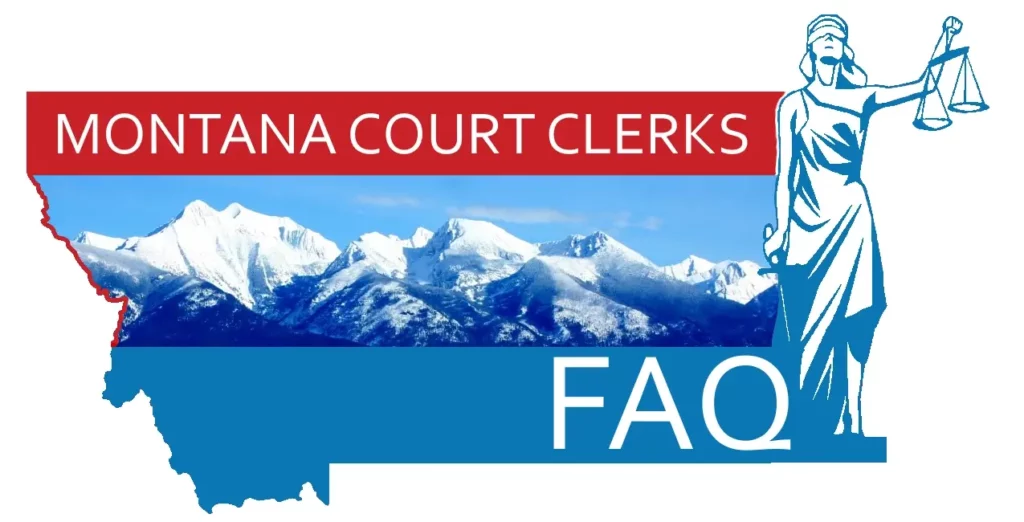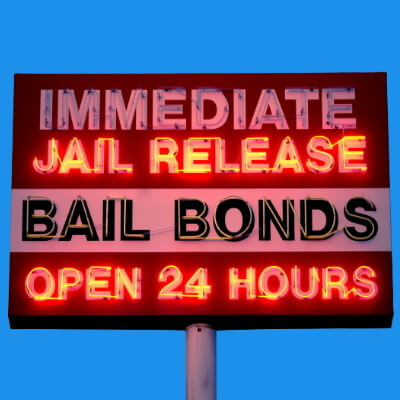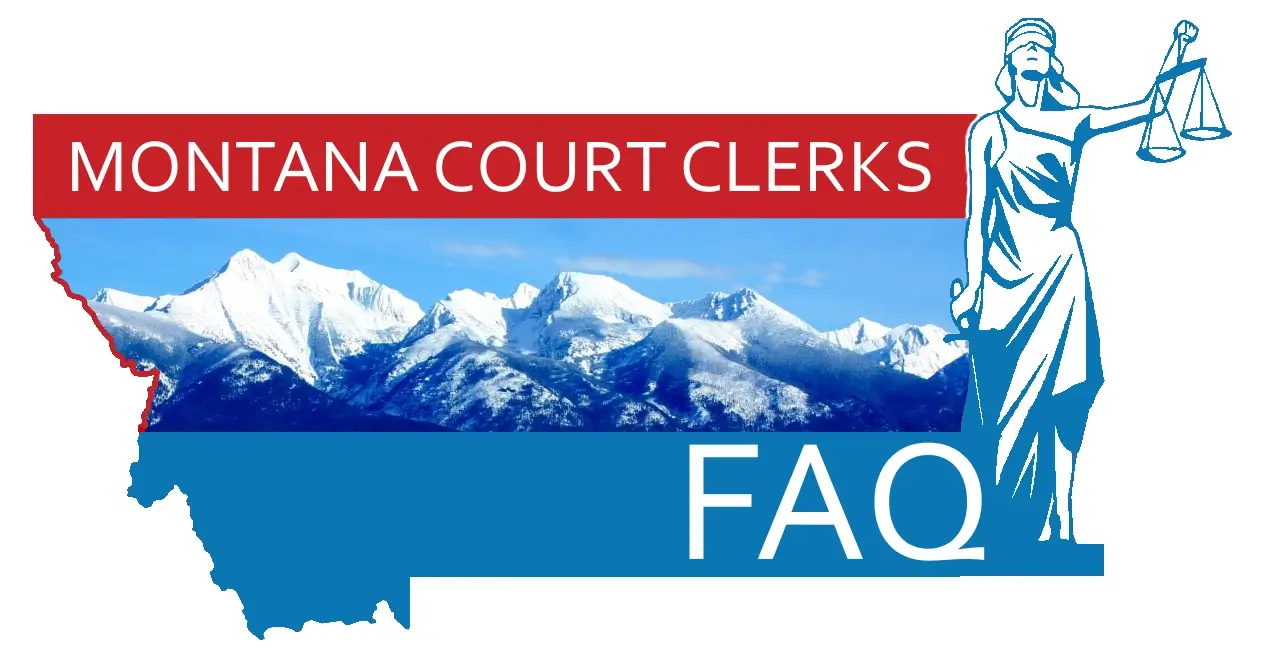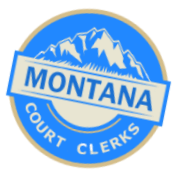you have questions, we have answers
FAQ about Montana Clerk of Courts
Ever wonder what a county court clerk in Montana does? What are their job duties and responsibilities? Or how much a court clerk is paid and how they get hired for the job?
MontanaCourtClerks.com has put together this FAQ (Frequently Asked Questions) page to answer all your questions about the court clerk system and how this job helps you, the citizen of Montana. If you feel something is missing, please reach out and contact us to let us know what to add or if information needs to be updated.
Need help with the Montana court system? Got questions about court clerks? This FAQ article has it all! Get informed decisions and make the court process simpler. All the answers you need, right here, right now!

Montana County Clerk FAQ
- FAQ about Montana Court Clerks Pay
- FAQ of Montana Court Clerk rules
- FAQ on how to get court clerk jobs
How much do court clerks make?
Montana court clerk salaries depend on education, experience, job duties, and other factors. As of writing this FAQ, clerks usually, they make around $36,500 a year. Plus, they may get healthcare and retirement packages. This job requires clear communication, detail-orientation, and offers chances for career growth. To become a Montana court clerk, you must have a high school diploma and do a training program.
Did you know court clerks are like the middlemen of bail bonds? They make sure criminals get their freedom back!
How do you get hired as a district court clerk?
To be employed as a district court clerk in Montana, you’ll need to meet certain requirements. Get a bachelor’s degree from an accredited institution and show your computer literacy skills. Also, do on-the-job training on court procedures, financial management, and customer service protocols.
You must also be a registered voter, have no felonies or misdemeanors related to moral turpitude, and pass a criminal record check. Once you’ve satisfied these conditions, you’ll need to know if the position is elected or appointed.
For elected positions, submit your personal information to the Secretary of State office and collect enough signatures based on county population size before the deadline. For appointed positions, apply through private firms or state-run staffing agencies.
In the past, this job was mostly for men who were lawyers or had experience in law. But with gender equality initiatives, it’s now open to people of all genders. So if you want to be a district court clerk in Montana, make sure you have the right skills, attitude and knowledge!
How do you get hired as a deputy court clerk?
If you’re keen to become a Deputy Court Clerk in Montana, here’s what you need to know about the application process.
Check for Vacancies: You can find job openings on reputable sites such as Indeed or State Job Service.
Submit an Application: Submit your application, including your resume, cover letter, and any documents that show your qualifications, online on MOLSTARS.
Undergo a Background Check: If your application is accepted, a background check will be conducted to check if you meet legal requirements.
Attend Interviews and Tests: If you pass the background check, you’ll be invited for an interview and assessment tests by the judicial district court.
Gaining experience in a similar role is advantageous, as is showing knowledge of office software applications. Use relevant keywords in resumes and cover letters to stand out from other applicants. Get the right qualifications, show an interest in the job, and you’ll have a better chance of getting hired!
How do you get hired as a court clerk?
Do you want to become a Montana Court Clerk? You must have a degree in legal studies or relevant work experience. Plus, you’ll need to pass a criminal background check and demonstrate proficiency in court software.
It’s time to apply! Go online through the Montana State Courts website. Submit all the details about your education and work experience. Then, the training officer will review your application and may invite you for an interview.
The job outlook varies among counties. But, it’s an amazing chance to work side-by-side with judges and attorneys. Don’t delay! Apply now before it’s too late. There’s a high demand for Montana Court Clerks, so act fast! Being a clerk means being an expert multitasker – part judge, part therapist, part secretary, and always caffeinated!
What are a court clerk’s responsibilities?
Montana Court Clerks are a must-have if you want court proceedings to run smoothly. They manage records, file documents, schedule cases and collect fees. They aide judges in their duties, like setting hearing dates and preparing paperwork. They are also the go-between for attorneys, judges, litigants and the public.
Court Clerks must be well-versed in the state’s rules of civil procedure and statutes. Plus, they always uphold a professional standard and keep confidential information private.
It’s a long-standing job. Records show Montana Court Clerk positions have been around since 1887. They have had a huge influence on justice in the state ever since.
What Does a Montana Court Clerk Do?
A Montana court clerk is an important role. They have various tasks, such as filing cases, maintaining records and scheduling cases. They must also notify relevant parties. Furthermore, they prepare dockets and update the judge with precedents.
Court clerks often arrange for juries. They must provide witness subpoenas and prepare related materials. In addition, they may manage court budgets, process payrolls and obtain funds from local authorities.
To become a Montana court clerk, prior work experience in office administration is beneficial. Time management skills and attention to detail are important. Plus, continuous learning about law proceedings is a must. This role is highly competitive, so be prepared to fight for it!
What are a Montana District Court Clerk responsibilities?
Montana District Court Clerks are responsible for a range of legal and administrative duties. They serve as the primary contact point for clients, attorneys and judges. Clerks manage cases by maintaining records, filing documents and issuing orders. They also must manage court calendars and procedures for motions, pleadings, and other documents. All duties must be done in strict accordance with state law.
Clerks must adhere to courtroom etiquette such as dress codes and protocol when addressing judges. They need to coordinate with outside agencies, while projecting a professional demeanor. Montana District Court Clerks are essential in making sure justice is served fairly and efficiently. Impartiality is key when performing their duties.
Best practices can help clerks be more efficient. This includes staying updated on legal requirements, thoroughly documenting processes and developing organizational skills to handle heavy workloads. With these skills, clerks can make sure justice is done – and bills are paid!
What do court clerks have to do with bail bonds?
Court clerks have an important role in managing bail bonds. They process paperwork and fees, and maintain records of bond transactions. They also provide info about court proceedings and criminal records to bondsmen. Furthermore, they collect money from bondsmen, refund bond amounts, and keep track of debts.
Moreover, clerks need to check that defendants meet bail conditions. This includes checking compliance with court orders, attendance at hearings, and other conditions in the release order. They may also remind defendants or their agents about upcoming court dates.
If a defendant fails to meet requirements or skips court, clerks initiate procedures for bail forfeiture. This includes notifying the surety company and filing documents to demand payment of the full bail amount.
It is important to understand the role of court clerks if you are a defendant or bail bondsman in Montana. Contact a local Montana Court Clerk office to ensure smooth handling of your case. Don’t miss out on important steps that could affect outcomes!
Where do I get a marriage license in Montana?
Wanting to marry in Montana? Visit the county clerk’s office. They can help with permits and check eligibility.
Plus, Montana double proxy marriages are allowed – though additional requirements may apply.
At the courthouse, court clerks witness unique love stories. One couple asked for a marriage license while standing 6ft apart due to COVID protocols – as only one was present.
No need to hire a criminal lawyer in Montana – just ask the court clerk!
What do court clerks do for criminal attorneys in Montana?
Montana court clerks are vital for criminal attorneys during court proceedings. They manage tasks such as docketing and calendaring, processing filings, and keeping records. They can also help Montana criminal attorneys get court forms and other resources.
Court clerks may have knowledge of particular judges and their habits. This can help defense attorneys prepare for upcoming trials. Plus, they can connect attorneys with other legal professionals in Montana.
The decisions of clerks can affect civil and criminal trial outcomes. For example, in 2008, an error by a court clerk led to a defendant getting a harsher sentence than the judge intended. So, it’s important that clerks and attorneys work together to avoid mistakes in civil and criminal trials.
No one can guarantee justice, but Montana court clerks can provide lots of services for legal needs.
What services are provided by the court clerks office in Montana?
Montana court clerks offer a range of services, from filing and processing legal documents, to providing info on cases, to managing records. Plus, they offer specialized help for self-represented litigants, like advice on forms and copies of filed docs. All this to guarantee justice for all who come before the courts.
It’s essential to use Montana court clerks’ services. You save time and money, and avoid costly mistakes that can hurt your case. Make an appointment with a court clerk today, to make sure you’re within the law’s boundaries. Why settle for just one type of court when Montana offers a whole variety pack of legal drama?
What are the different types of courts in Montana?
Montana has lots of courts that serve its people. Let’s learn about them! This article will show us the different types of courts in Montana and what they do.
City Court: Civil and criminal cases with city ordinances
Justice Court: Civil cases up to $12,000, felony hearings, misdemeanors
Municipal Court: Traffic violations and ordinance breaches inside city limits
District Court: Criminal Felony Cases; Divorce; Small Claims over $12,000; Estate Matters
What is the rule 2 in Montana district court?
Rule 2 – Motions. (b) Filing Briefs in Support of Motions. The moving party shall file with the court a supporting brief upon filing a motion. The brief may be accompanied by appropriate supporting documents.
How many city courts are there in Montana?
The Courts of Limited Jurisdiction in Montana are Justice Courts, City Courts and Municipal Courts. There are 61 Justice Courts, 84 City Courts and 6 Municipal Courts.
What is the highest court in Montana?
the Montana Supreme Court
How many district courts does Montana have?
56 District Courts
COUNTY CLERK SERVICES in montana

MONTANA BAIL BONDS
Need to post bail in Montana? How to get online bail bonds in any county and what you need to get someone out of jail fast, for the lowest cost.



